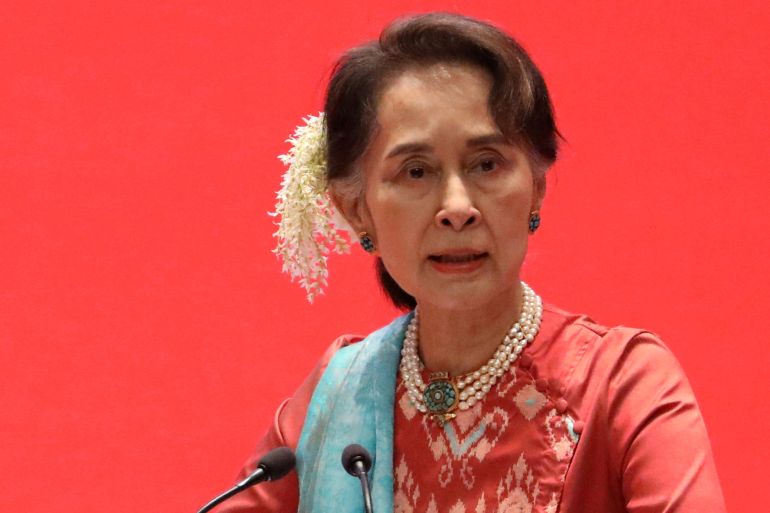Myanmar court finds Aung San Suu Kyi guilty, adds 7 years in jail
Following a series of politically motivated prosecutions, Aung San Suu Kyi now must serve a total of 33 years in jail.

A court in military-ruled Myanmar has found the country’s toppled leader Aung San Suu Kyi guilty of corruption charges, sentencing her to seven years in prison in the last of a string of criminal cases in an 18-month-long trial process, a legal official said.
A prisoner of the military since a 2021 coup, Aung San Suu Kyi, 77, has now been convicted on every charge levelled against her, ranging from corruption to illegally possessing walkie-talkies and flouting COVID-19 restrictions.
Keep reading
list of 4 itemsUN Myanmar envoy ‘very concerned’ about Aung San Suu Kyi’s health
Aung San Suu Kyi, Australian economic adviser jailed in Myanmar
Military-ruled Myanmar hands Aung San Suu Kyi more prison time
The court’s ruling on Friday leaves the deposed leader with a total of 33 years to serve in prison following the series of politically motivated prosecutions in the wake of the military seizing power in February 2021.
“All her cases were finished and there are no more charges against her,” a legal source, who requested anonymity as they were not authorised to speak to the media, told AFP news agency.
In the case that concluded on Friday, Aung San Suu Kyi was alleged to have abused her position and caused a loss of state funds by neglecting to follow financial regulations in granting permission to Win Myat Aye, a cabinet member in her former government, to hire, buy and maintain a helicopter.
Aung San Suu Kyi was the de facto head of the government, holding the title of state counsellor. Win Myint, who was president in her government, was a co-defendant in the same case.
Aung San Suu Kyi’s previous convictions had already landed her a total of 26 years imprisonment.
“The question now will be what to do with Aung San Suu Kyi,” said Richard Horsey of the International Crisis Group.
“Whether to allow her to serve out her sentence under some form of house arrest, or grant foreign envoys limited access to her,” he said.
“But the regime is unlikely to be in any rush to make such decisions.”
The European Union condemned the move and said the trials were “purely politically motivated” by the ruling army.
“These trials were carried forward with no respect for due legal procedure or necessary judicial guarantees and are a clear attempt to exclude democratically elected leaders from political life,” an EU spokesman said.
The United States also condemned Friday’s ruling, and demanded Aung San Suu Kyi’s release.
“The Burma military regime’s final sentencing of State Counsellor Aung San Suu Kyi is an affront to justice and the rule of law,” a State Department spokesperson said, using Myanmar’s former name and the veteran leader’s title before she was ousted.
Supporters and independent analysts said the numerous charges against Aung San Suu Kyi and her allies are an attempt to legitimise the military’s power grab while effectively eliminating her from political life in the country.
Phil Robertson, deputy Asia director of Human Rights Watch, said in a tweet that Aung San Suu Kyi had “no possibility of justice” in the “kangaroo courts” of military-ruled Myanmar.
The farce continues! #Myanmar set to sentence Aung San Suu Kyi today on more politically motivated & fabricated charges heard before junta's kangaroo courts. No possibility of justice! SAC seeking to sideline ASSK/NLD before possible bogus 2023 "elections" https://t.co/EELlQBb7WW pic.twitter.com/PzsjY1Mcac
— Phil Robertson (@Reaproy) December 30, 2022
The corruption charges against the Noble Peace Prize laureate were “ridiculous”, Htwe Htwe Thein, an associate professor at Curtin University in Australia, told AFP.
“Nothing in Aung San Suu Kyi’s leadership, governance, or lifestyles indicates the smallest hint of corruption.”
More than one million people have been displaced since the military coup, according to the United Nations children’s agency.
The Assistance Association for Political Prisoners, a rights monitoring organisation, said recently that more than 16,000 people had been arrested on political charges and at least 2,465 civilians had been killed by the military, although the actual number is thought to be far higher.
The army’s takeover in 2021 triggered widespread peaceful protests that the security forces tried to crush with deadly forces and which has now led to an armed resistance movement.
Friday’s verdict in the purpose-built courtroom in the main prison on the outskirts of the capital, Naypyidaw, was made known by a legal official who insisted on anonymity for fear of being punished by the authorities. The trial was closed to the media, diplomats and spectators, and her lawyers were barred by a gag order from talking about it.
The legal official said Aung San Suu Kyi received sentences of three years for each of four charges, to be served concurrently, and four years for the charge related to the helicopter purchase, for a total of seven years. Win Myint received the same sentences.
The defendants denied all the charges. Aung San Suu Kyi’s lawyers are expected to appeal in the coming days.
The end of the court cases against her, at least for now, raises the possibility that she would be allowed outside visitors, which she has been denied since being imprisoned.
The military government has repeatedly denied all requests to meet her, including from the Association of Southeast Asian Nations, which seeks to help mediate an end to the crisis in Myanmar that some UN experts have characterised as a civil war because of the armed opposition to military rule.
Last week, the UN Security Council called on the military government to release Aung San Suu Kyi in its first resolution on the situation in Myanmar since the coup.